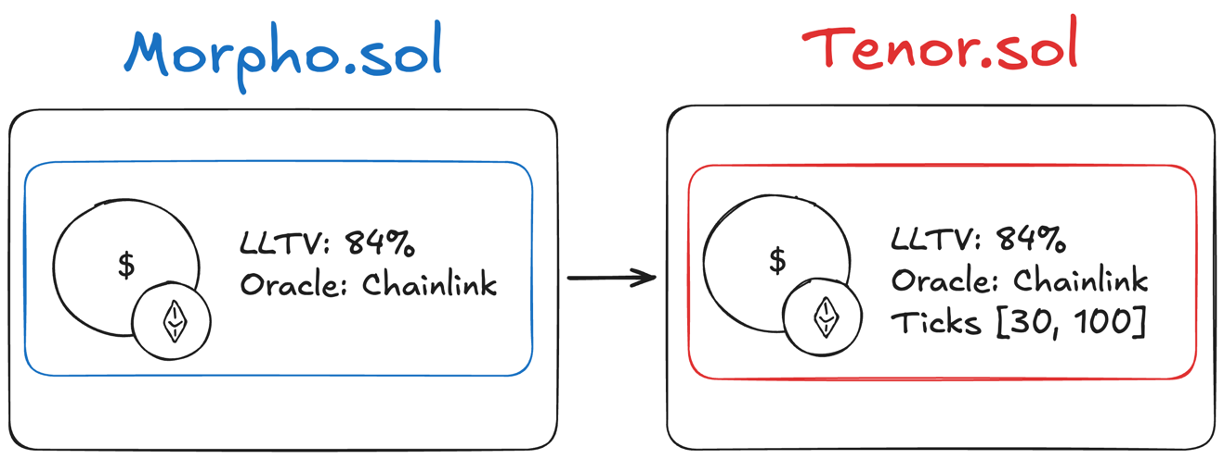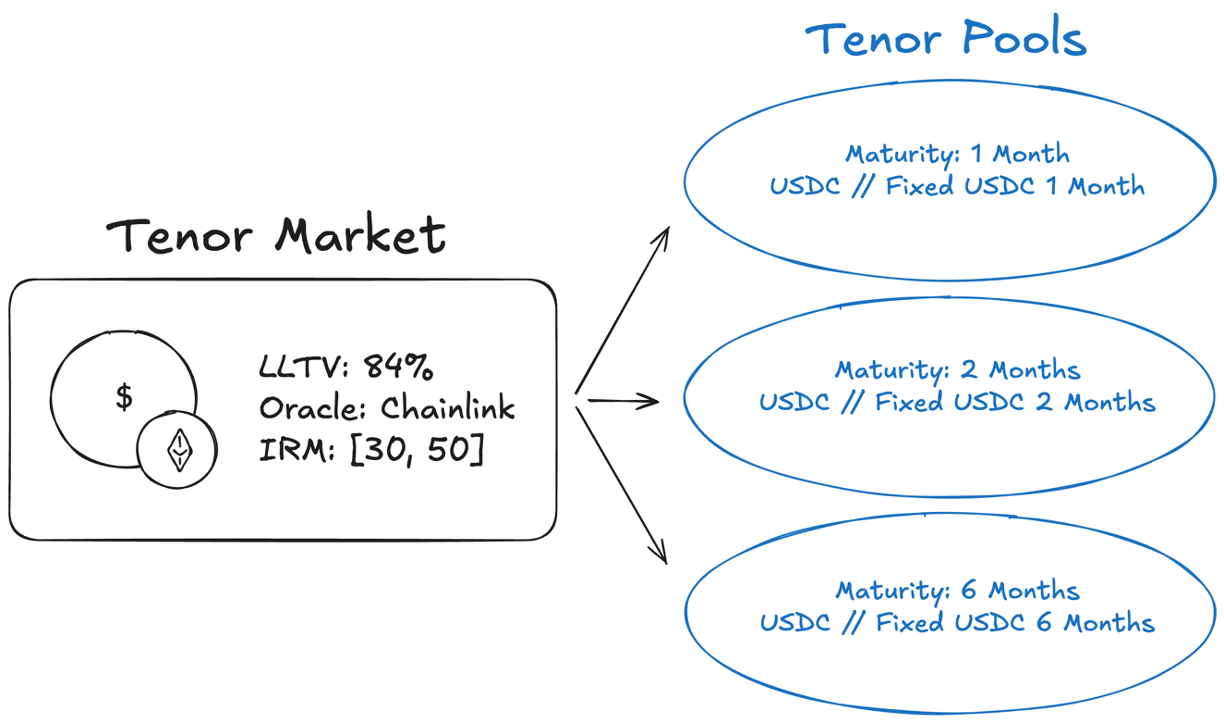Curate Markets
Introduction
The Tenor protocol enables Market Curators to create fixed rate markets on top of existing Morpho markets. By creating fixed rate markets and initializing associated maturities, Market Curators benefit from the following features:
- Fee Generation: Curators can collect fees every time lenders and borrowers are matched within their pools.
- Simple Market Creation: All risk parameters—such as LLTVs and oracles—are automatically inherited from the reference Morpho market, making market creation simple. Additionally, Fixed Rate Pool parameters only need to be set once, simplifying the process for Curators.
- Builds on Morpho’s Liquidity: When creating a fixed rate market on the Tenor protocol, it instantly benefits from the existing liquidity already available on Morpho, making idle liquidity yield bearing and simplifying borrower settlement.
- Distinctive Offering: Tenor Markets allow curators to offer expanded features to protocols and users. Fixed rates enable borrowers and lenders to benefit from improved matching efficiency and lock in a rate for a set period of time for increased predictibility.
Role of a Curator
The role of a Curator in the Tenor protocol can be summarized as follows:
- Create Tenor Markets
- Create Tenor Pools of different maturities
- Set Fees
- Set Roles (ex: recipients)
Market Creation Process
Curators can create Tenor Markets for any money market listed on Morpho. To do so, they simply need to provide the following parameters to the Tenor contract:
- Pool Manager contract address
- Morpho market reference market ID
- bpsPerTick (Interest rate granularity of pools)
- maxTick (Maximum pool interest rates)
All parameters from the reference Morpho market, such as the oracle, LLTV, and collateral asset address, are automatically passed into the Tenor contract using the Morpho market ID. This feature simplifies market listing, facilitates interactions between the Tenor protocol and Morpho, and streamlines market parameter selection.

Multi-collateral Support
When creating a Market, the Tenor protocol supports multi-collateral markets. A market curator could list a market with multiple collateral assets (e.g., WETH and wstETH). Multi-collateral markets enable borrowers to borrow the loan token against a broader set of collateral assets and can further mitigate liquidity fragmentation.
Pools
Once a Tenor Markets is created, curators must initialize at least one Tenor Pool of their choosen maturity date to allow users to lend and borrow at fixed rates. To create a new pool, they can call the initialize pool function by providing two parameters to the Tenor contract:
- Pool Maturity Date
- Tenor Market ID
Tenor Markets are the component of the protocol that stores assets (collateral and Fixed Debt Tokens) and computes the accounting for borrowers. Tenor Pools are the component that enables the lending and borrowing of loan assets at a fixed rate for a defined maturity. The relationship between markets and pools is as follow.

Fees
Curators can generate fees by taking a portion of the lending and borrowing fees from their pools. Anytime a user swaps, they pay a fee equivalent to the size of an interest tick. In the absence of Market Curator fees, fees paid by lenders and borrowers are collected by liquidity providers who placed limit orders. Curators can set a fee sharing parameter ranging from 0% to 100% to collect part of the swapper fees.
Curators can make market and pool creation permissioned or permissionless. If a Curator decides to make market and pool creation permissionless, they can still claim fees generated from the swapping in the pools.
Roles
When creating a market the curator can set the following roles:
- Fee Recipient
- Pauser
- Owner
Fee Recipient
The Fee Recipient receives the fees generated from lend and borrow transactions in the pools in accordance to the fee share set by the Curator.
Pauser
The pauser can pause and unpause the Pool Manager contract. Pausing the pool manager puts the contract in withdrawal-only mode, allowing limit order users to remove their liquidity. Pausing a market simply pauses the swapping function for all pools within the Pool Manager. The pauser can also unpause the Pool Manager contract if needed.
Owner
The owner can update the fee recipient, update the pauser address, and update the owner of the PoolManager contract itself. The owner can also set the fee share parameter on limit orders. The fee share is applied uniformly to all pools in the pool manager contract. Updating the fee share parameter only affects pools listed subsequently and will have no effect on pools already active.